What Makes Yogurt TRULY Healthy?
Have you noticed the explosion of yogurt brands and yogurt-based products over the last couple years? It’s mind boggling. And overwhelming if your goal is to find the most pure, natural commercial yogurt available.
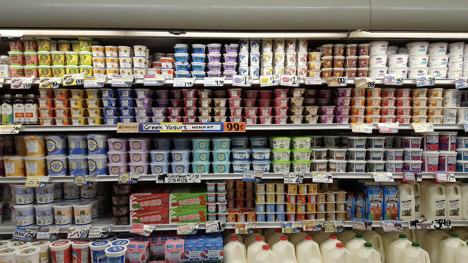
Seeking the purest yogurt is a worthwhile endeavor, considering all its health benefits. Made by the bacterial fermentation of lactose (milk’s natural sugar), yogurt cultures contain nearly every nutrient the body needs (protein, calcium, B vitamins—especially B12 and riboflavin, phosphorus, magnesium, potassium, and loads of trace minerals).
Then add to this already marvelous mixture of healthiness, probiotics. Probiotics are the healthy bacteria that support and protect digestive health. Unfortunately, most brands of yogurt have been pasteurized (a heat treatment that kills the beneficial bacteria they contain). To ensure your yogurt contains effective probiotics, look for one that contains live, active cultures (which, if it does, will definitely be listed on the label).
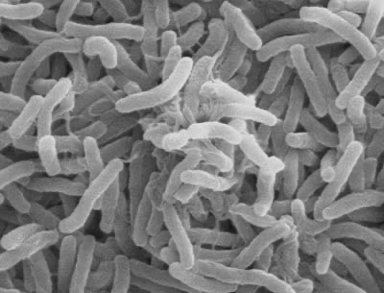
The mention of LIVE cultures and labels brings me to my point. Off and on over the years I’ve made my own yogurt. It’s not easy, considering the healthiest (containing the most active cultures) needs raw milk. Dairy products are so closely regulated today, that it’s almost impossible to find raw milk. And when you can, the product price is usually very very expensive.
Thus, I’m always on the hunt for the best commercially-made yogurt. Lots of brands claim they contain a wide spectrum of live cultures (typically S. thermophilus and L. bulgaricus). That’s good; but the downside is all the other junk they contain. For instance, a container of Chobani Vanilla® yogurt contains cultured pasteurized nonfat milk (remember, pasteurization kills ALL bacteria—not just the bad, but the good as well), cane sugar, water, fruit pectin, natural flavors (beware of the “natural” label), vanilla extract, guar gum, and lemon juice concentrate.
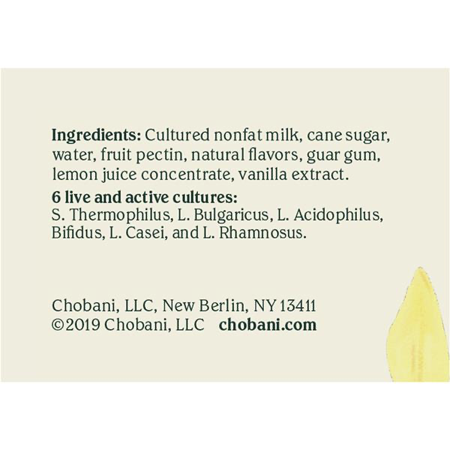
This Chobani label is typical of other brands I’ve studied. Lots also contain high fructose corn syrup (HFCS), malic acid, and are thickened with modified corn starch. My intent here isn’t to brand bash; I just want you to be aware of what’s going on in the yogurt market and know enough to make better choices.
What IS a better choice, a truly healthy yogurt, then? One brand I can comfortably recommend is Nancy’s (from Eugene, OR). By law, all commercial dairy must be pasteurized. So, Nancy’s introduces their yogurt cultures after their milk has cooled, thus ensuring that all probiotics are actually live. And like other high-end commercial yogurts, Nancy’s contains Bifidobacterium lactis, S. thermophilus, L. acidophilus, L. rhamnosus LB3, L. casei, L. rhamnosus. And Nancy’s contains 41 billion live probiotics minus the HFCS and extra thickeners.
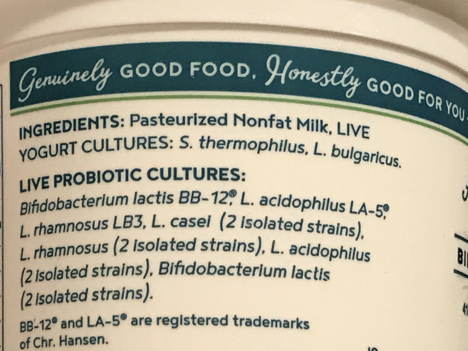
I also like supporting Nancy’s because they’re a small, family-owned dairy. I’m not a fan of gigantic food conglomerates. With that, I’ll close this yogurt science class with some yogurt-using tips of my own:
Plain yogurt is an excellent substitute for sour cream. Next time you make your own Ranch dressing, use plain yogurt for a super health boost. We also fold it into salsa for an even healthier chip dip.
Sweeten plain yogurt with local raw honey or pure maple syrup. This makes a yummy dessert on its own or as a nice topping for pancakes, waffles, etc.
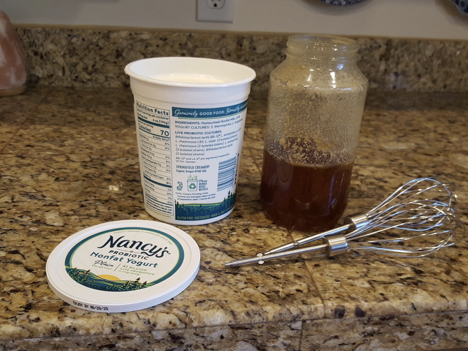
Fold watermelon cubes into this sweetened yogurt for a scrumptious fruit salad.
And if you do decide to give Nancy’s a try, check out their site (www.nancysyogurt.com) for some more creative and delicious ways to use it.
Finally, for those of you that are lactose intolerant, there are now some pretty good brands of nut-milk yogurts showing up. Kite and Forager are two I’ve tried that I like. I hope this information will be helpful the next time you’re on the hunt yourself for the healthiest yogurt available.

Seeking the purest yogurt is a worthwhile endeavor, considering all its health benefits. Made by the bacterial fermentation of lactose (milk’s natural sugar), yogurt cultures contain nearly every nutrient the body needs (protein, calcium, B vitamins—especially B12 and riboflavin, phosphorus, magnesium, potassium, and loads of trace minerals).
Then add to this already marvelous mixture of healthiness, probiotics. Probiotics are the healthy bacteria that support and protect digestive health. Unfortunately, most brands of yogurt have been pasteurized (a heat treatment that kills the beneficial bacteria they contain). To ensure your yogurt contains effective probiotics, look for one that contains live, active cultures (which, if it does, will definitely be listed on the label).

The mention of LIVE cultures and labels brings me to my point. Off and on over the years I’ve made my own yogurt. It’s not easy, considering the healthiest (containing the most active cultures) needs raw milk. Dairy products are so closely regulated today, that it’s almost impossible to find raw milk. And when you can, the product price is usually very very expensive.
Thus, I’m always on the hunt for the best commercially-made yogurt. Lots of brands claim they contain a wide spectrum of live cultures (typically S. thermophilus and L. bulgaricus). That’s good; but the downside is all the other junk they contain. For instance, a container of Chobani Vanilla® yogurt contains cultured pasteurized nonfat milk (remember, pasteurization kills ALL bacteria—not just the bad, but the good as well), cane sugar, water, fruit pectin, natural flavors (beware of the “natural” label), vanilla extract, guar gum, and lemon juice concentrate.

This Chobani label is typical of other brands I’ve studied. Lots also contain high fructose corn syrup (HFCS), malic acid, and are thickened with modified corn starch. My intent here isn’t to brand bash; I just want you to be aware of what’s going on in the yogurt market and know enough to make better choices.
What IS a better choice, a truly healthy yogurt, then? One brand I can comfortably recommend is Nancy’s (from Eugene, OR). By law, all commercial dairy must be pasteurized. So, Nancy’s introduces their yogurt cultures after their milk has cooled, thus ensuring that all probiotics are actually live. And like other high-end commercial yogurts, Nancy’s contains Bifidobacterium lactis, S. thermophilus, L. acidophilus, L. rhamnosus LB3, L. casei, L. rhamnosus. And Nancy’s contains 41 billion live probiotics minus the HFCS and extra thickeners.

I also like supporting Nancy’s because they’re a small, family-owned dairy. I’m not a fan of gigantic food conglomerates. With that, I’ll close this yogurt science class with some yogurt-using tips of my own:
Plain yogurt is an excellent substitute for sour cream. Next time you make your own Ranch dressing, use plain yogurt for a super health boost. We also fold it into salsa for an even healthier chip dip.
Sweeten plain yogurt with local raw honey or pure maple syrup. This makes a yummy dessert on its own or as a nice topping for pancakes, waffles, etc.

Fold watermelon cubes into this sweetened yogurt for a scrumptious fruit salad.
And if you do decide to give Nancy’s a try, check out their site (www.nancysyogurt.com) for some more creative and delicious ways to use it.
Finally, for those of you that are lactose intolerant, there are now some pretty good brands of nut-milk yogurts showing up. Kite and Forager are two I’ve tried that I like. I hope this information will be helpful the next time you’re on the hunt yourself for the healthiest yogurt available.
Sources:
- www.healthycarrie.com
- www.sciencebuddies.org
- www.hy-vee.com
- www.loribrizee.com
 Alice Osborne
Alice Osborne
Weekly Newsletter Contributor since 2006
Email the author! alice@dvo.com
